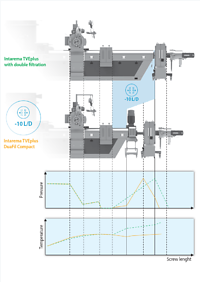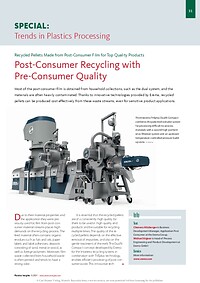This article was published in the trade magazine Plastics Insight, issue 8/2024
Most of the post-consumer film is obtained from household collections, such as the dual system, and the materials are often heavily contaminated. Thanks to innovative technologies provided by recycling specialist EREMA, recycled pellets can be produced cost effectively from these waste streams, even for sensitive product applications.
Due to their material properties and the application they were previously used for, film from post-consumer material streams places high demands on the recycling process. The feed material often contains organic residues such as fats and oils, paper labels and label adhesives, deposits consisting of sand, metal or wood, as well as foreign polymers. Moreover, film waste collected from household waste is often printed and tends to have a strong odour. It is essential that the recycled pellets are of a consistently high quality for them to be used in high-quality end products and be suitable for recycling multiple times. The quality of the recycled pellets depends on the effective removal of impurities, and also on the gentle treatment of the melt. The DuaFil® Compact concept developed by EREMA for the INTAREMA® recycling system, in combination with TVEplus® technology, enables efficient processing of post-consumer waste. This innovative technology produces outstanding melt quality at a high throughput with low energy consumption.
Filtration and degassing optimise polymer melt
Effective filtration is one of the key strengths of the newly-developed double filtration solution. The preconditioning unit (PCU) prepares the feed material gently using counter current technology, and it is then homogenised, compacted, dried and preheated. Thanks to the special pre-treatment and gentle melt handling during the plasticising process, dirt particles and impurities as well as foreign polymers, e.g. PET or PA, remain large enough to be removed from the melt by the laser filter at an early stage. The early removal of unwanted substances prevents the formation of disruptive decomposition products that would otherwise result in unpleasant odours. This is a decisive quality feature for the melt and the subsequent finished product. Downstream of the first filtration unit, prior to degassing, the "plus zone", which can be precisely adapted to the special requirements of the different material flows, homogenises the melt and brings it to the optimum melt temperature for the respective application. In EREMA systems, degassing always takes place in three stages: the first stage is in the PCU, followed by reverse extruder degassing thanks to the ingenious design of the screw. The final double venting degassing zone is particularly effective and removes any volatile components still present in the melt. Thanks to the design of the DuaFil® Compact system, the melt is degassed particularly effectively, which is crucial when handling organic contaminants and heavily printed film. Ultimately, the machine features a much higher free screw volume at the degassing stage, and, as a result, achieves a higher degassing capacity of up to 33 %*.
Lower melt temperature reduces energy consumption
Decoupling the build-up of pressure and temperature is a key factor towards increasing the quality of the recycled pellets. With conventional double filtration solutions, the highest temperature during the extrusion process occurs upstream of the second filtration phase, after degassing. In the INTAREMA® TVEplus® DuaFil® Compact, the polymer melt reaches its highest temperature before the extruder degassing stage. The new process significantly reduces the risk of the decomposition products and volatile components forming that cause odours, discolouration and outgassing of the recycled pellets. This is a decisive advantage, especially with organic materials, such as contaminant food residues and cellulose substances such as paper and wood.
Decoupling pressure and temperature build-up using a newly developed control concept for the way the extruder and melt pump work together means that the extruder is shorter (minus 10 L/D*), the melt temperature is reduced by an average of 20°C*, and the energy consumption of the whole system is 10% lower*. At the same time, system throughput is up 10 %*. As a result, both OpEx (energy) and also CapEx (investment per kg of throughput) have been reduced. On top of the technical advantages, this is also an attractive package in terms of cost effectiveness.
By locating primary filtration upstream of the melt pump in INTAREMA® TVEplus® DuaFil® Compact systems, there is another advantage. Only cleaned and degassed melt flows through the pump, greatly reducing wear and significantly increasing the service life of the system components for post-consumer applications.
Optimised process conditions to meet the highest-specification product applications
Originally, the main applications for recycled pellets made from household waste collections were construction films and bin liners with a film thickness greater than 40 µm. Now, newly developed DuaFil® Compact technology is able to meet the requirements of a broader, more challenging market segment. Depending on the polymer, this technology can, for the first time, build up the pressure needed to achieve filtration of up to 30 µm during the second filtration stage cost effectively without throughput restrictions. This means that proportions of up to 50% washed LD/LLDPE film flakes (DSD 310) can be used in high-quality PCR shrink films, up to 30% rPE post-consumer supermarket film (e.g. 98/2) in 8 µm stretch films, and up to 50% in shrink films with a thickness greater than 20 µm. The first systems delivered to customers confirm the tests carried out in the EREMA technical centre and have led to significant improvements.
Odour-optimised and food-safe
Another milestone is the effective removal of odours. This is another reason why recycled pellets from post-consumer collections are now capable of being used in higher-value applications. The decisive factor here is the neutralisation of undesirable odours, which the advantages offered by the INTAREMA® TVEplus® DuaFil® Compact enable thanks to their optimised degassing performance and gentle material processing in combination with the ReFresher anti-odour technology. Even feed materials with a high level of odour contamination can be processed to produce high-quality recycled pellets. Solid phase diffusion is used to continuously remove volatile components from the pellets. Using the residual heat within the system and heat exchanger systems makes the process particularly energy efficient. The American authority for food safety has approved the system combination for food grade materials, meaning that PO recycled pellets from defined input streams (e.g. commercial post-consumer LL/LLDPE stretch and shrink film) can be used in food packaging in proportions of up to 100%.
In Europe, there is currently no food-grade authorisation for polyolefins. Since October 2022, EU directive 2022/1616 has offered the possibility of early approval of new recycling technologies for direct food contact using a "novel technology" (see info box). EREMA supports recycling companies in generating data and evidence for the EFSA (European Food Safety Authority) assessment process.
* in comparison to previous EREMA dual filter solution
EU directive 2022/1616 regulates the use of recycled plastic in materials with direct food contact to ensure consumer safety and promote the circular economy. The aim is to standardise requirements and accelerate approval procedures by using novel technologies, i.e. innovative recycling processes that are subject to a more flexible evaluation process. Manufacturers, recycling companies and independent laboratories test the recycled pellets to see if they contain any problematic substances. If the results are safe, provisional approval can be applied for from the EU Commission after 6 months. After 2 years, during which data will continue to be generated, the EFSA will decide on the final suitability of the technology for direct food contact.



PRESS CONTACT
Julia Krentl
Corporate Communication
EREMA Group
Unterfeldstraße 3
4052 Ansfelden, AUSTRIA
Phone: +43 732 3190 6092
Email: public.relations@erema-group.com